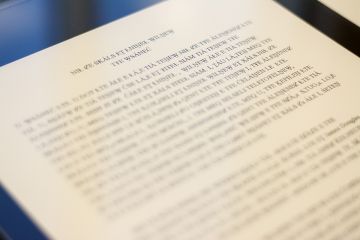Humanities, languages, arts: A luxury? A mission? A must?
- Helene Cazes and Gordon Shrimpton
Are language departments under threat in the neo-liberal academic landscape? The brutal announcement of "termination" for language departments, including classics, and the drama programs at SUNY Albany last September sounded a shrill alarm.Instantly, petitions supporting the condemned departments, open letters to the university president, and demonstrations of support for the faculty and students were circulated on the web and commented on in dozens of blogs. Suddenly, as if some invisible and tacit border had been transgressed, academics-and notably a talented biologist and polemicist-were concerned for the fate of smaller humanities departments. The concern for humanities had crossed the garden fence of disciplines.
A similar emotional outpouring served well the Centre for Comparative Literature at the University of Toronto; following the public announcement of its dismantlement, hundreds of signatures and open letters stopped the process at the inception and saved the day! Polemics and rallies, however, are not sound management strategies. Under financial stress, institutions must reduce or eliminate "luxuries." Schools cut music and art programs, and the US Congress sets its sights on the Public Broadcasting System and the National Endowment for the Arts.
So who decides what a "luxury" is and how? The inevitability of cuts to arts programs in schools when money is short establishes an expectation in the public mind. So when another public institution, like a university, runs short of money, what will it do? No administrator wants to deal with a public outcry, so why not take the line of least resistance and close down programs where public apathy is most to be expected?
The outcry at SUNY and Toronto must have come as a surprise to the administration, but demonstrations after the fact are not substitutes for the dialogue that needs to take place. Music was once a central part of education: in Plato's Academy in ancient Greece, and in Charlemagne's Palace School during the medieval period. Now, not subject to formal examination by the provincial government, it is marginalized.
The values that drive our expectations for a publicly funded education system should benefit from a critical public airing. Parents want their children to succeed, and success usually means jobs, but it is this assumed relationship between education and jobs that needs scrutiny. What is the relationship, for example, between algebra (part of our core curriculum) and any person's day-to-day work? If algebra is defended by arguing that it teaches certain mental skills, the same argument can be used of music.
Even "success" deserves reconsideration. If it is an economic term, as many people use it, the economy changes much faster than school curricula these days. In fact, according to the very influential Daniel Pink (A Whole New Mind. Why Right Brainers Will Rule the Future), our core curriculum holds our young people back more than preparing them for the new economy. What it needs is more training in languages, culture, creativity, more-music.
Dr. H&e#180;lène Cazes is a faculty member in the Department of French and Dr. Gordon S. Shrimpton is professor emeritus, Greek and Roman studies
---------
Editor's note: Views expressed in this Viewpoint are the authors' and do not necessarily reflect those of The Ring or the University of Victoria.
In this story
Keywords: languages and linguistics, arts




